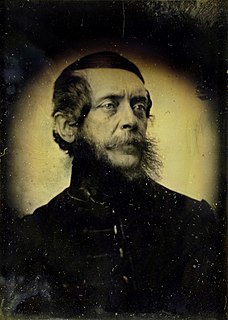A Quote by Marquis de Sade
Man's natural character is to imitate; that of the sensitive man is to resemble as closely as possible the person whom he loves. It is only by imitating the vices of others that I have earned my misfortunes.
Related Quotes
It is possible that the scrupulously honest man may not grow rich so fast as the unscrupulous and dishonest one; but the success will be of a truer kind, earned without fraud or injustice. And even though a man should for a time be unsuccessful, still he must be honest: better lose all and save character. For character is itself a fortune. . . .
Pride is the recognition of the fact that you are your own highest value and, like all of man's values, it has to be earned-that of any achievements open to you, the one that makes all others possible is the creation of your own character-that your character, your actions, your desires, your emotions are the products of the premises held by your mind.
A good father. A man with a head, a heart, and a soul. A man capable of listening, of leading and respecting a child, and not of drowning his own defects in him. Someone whom a child will not only love because he's his father, but will also admire for the person he is. Someone he would want to grow up to resemble.
Feuerbach ... recognizes ... "even love, in itself the truest, most inward sentiment, becomes an obscure, illusory one through religiousness, since religious love loves man only for God's sake, therefore loves man only apparently, but in truth God only." Is this different with moral love? Does it love the man, this man for this man's sake, or for morality's sake, for Man's sake, and so-for homo homini Deus-for God's sake?
One of the commonest causes of failure in Christian life is found in the attempt to follow some good man whom we greatly admire. No man and no woman, no matter how good, can be safely followed. If we follow any man or woman, we are bound to go astray. There has been but one absolutely perfect Man on this earth-the Man Christ Jesus. If we try to follow any other man we are surer to imitate his faults than his excellencies. Look to Jesus and Jesus only as your Guide.
There is a sort of natural instinct of human dignity in the heart of man which steels his very nerves not to bend beneath the heavy blows of a great adversity. The palm-tree grows best beneath a ponderous weight, even so the character of man. There is no merit in it, it is a law of psychology. The petty pangs of small daily cares have often bent the character of men, but great misfortunes seldom. There is less danger in this than in great good luck.
Some determined advocates of the vegetable system maintain, that the teeth and stomach of the monkey correspond, in structure, very closely with that of man, yet it lives on fruits - therefore if man followed nature, he would live on fruits and vegetables. But though the anatomical likeness between man and monkeys is striking, yet it is not complete; the difference may be and doubtless is precisely that which makes a difference of diet necessary to nourish and develope their dissimilar natures. Those who should live as the monkeys do would most closely resemble them.
One of man's important mistakes, one which must be remembered, is his illusion in regard to his I. Man such as we know him, the 'man-machine,' the man who cannot 'do,' and with whom and through whom everything 'happens,' cannot have a permanent and single I. His I changes as quickly as his thoughts, feelings and moods, and he makes a profound mistake in considering himself always one and the same person; in reality he is always a different person, not the one he was a moment ago.
There are three kinds of nature in man, as Nicetas Stethatos further explains: the carnal man, who wants to live for his own pleasure, even if it harms others; the natural man, who wants to please both himself and others; and the spiritual man, who wants to please only God, even if it harms himself. The first is lower than human nature, the second is normal, the third is above nature; it is life in Christ.






































